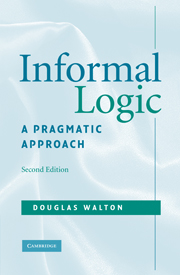Book contents
- Frontmatter
- Contents
- Preface
- Acknowledgments
- Informal Logic
- 1 Argument as reasoned dialogue
- 2 Questions and answers in dialogue
- 3 Criticisms of irrelevance
- 4 Appeals to emotion
- 5 Valid arguments
- 6 Personal attack in argumentation
- 7 Appeals to authority
- 8 Inductive errors, bias, and fallacies
- 9 Natural language argumentation
- Bibliography
- Index
7 - Appeals to authority
Published online by Cambridge University Press: 05 June 2012
- Frontmatter
- Contents
- Preface
- Acknowledgments
- Informal Logic
- 1 Argument as reasoned dialogue
- 2 Questions and answers in dialogue
- 3 Criticisms of irrelevance
- 4 Appeals to emotion
- 5 Valid arguments
- 6 Personal attack in argumentation
- 7 Appeals to authority
- 8 Inductive errors, bias, and fallacies
- 9 Natural language argumentation
- Bibliography
- Index
Summary
The ad hominem attack is the negative use of personal argumentation to undermine or destroy the credibility of a person in a critical discussion. An opposite type of tactic is the argument from expert opinion, which uses the opinion of a respected authority or expert on a subject as positive personal argumentation to support one's own side of an argument. The ad hominem criticism attacks a person as an untrustworthy source, while the argument from expert opinion cites an expert who is presumably reliable and authoritative as a source of advice. In certain respects however, these two types of argumentation are similar. Both are appeals to personal sources of opinion that center on the internal position or credibility of a particular individual as a reliable source of knowledge. Both types of argumentation can be contrasted with the appeal to external or objective knowledge, which comes from scientific evidence such as experimental observations, the kind of knowledge that comes from nature, not from a personal source.
In general, the use of argument from expert opinion is a reasonable, if inherently defeasible, type of argument. Appeals to expert opinion can be a legitimate form of obtaining advice or guidance for drawing tentative conclusions on an issue or problem where objective knowledge is unavailable or inconclusive. It is well recognized in law, for example, where expert testimony is treated as an important kind of evidence in a trial, even though it often leads to conflicting testimony, in a “battle of the experts.”
- Type
- Chapter
- Information
- Informal LogicA Pragmatic Approach, pp. 209 - 245Publisher: Cambridge University PressPrint publication year: 2008



